| Srl | Item |
| 1 |
ID:
092705
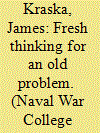

|
|
|
| 2 |
ID:
111124
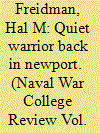

|
|
|
|
|
| Publication |
2011.
|
| Summary/Abstract |
War is about wreckage. Consequently, postwar periods tend to be about reconstruction, and that phenomenon is what this article is about. It sets
the scene for a larger exploration (the subject of projected sequels to the recent
book from which this article is adapted) of how a military-academic institution
-the Naval War College, in Newport, Rhode Island-attempted to readjust to a
peacetime period that entailed simultaneously the
start of a new type of conflict for the United States
(the Cold War) and with a revolutionary new weapon
(the atomic bomb). While the Cold War and the
Atomic Age were revolutionary in many respects, at
their outset the staff, instructors, guest lecturers, and
students at the Naval War College did not automatically or necessarily think so. To a great degree, American military officers in the immediate postwar period,
while acknowledging that atomic energy weapons and
"war during peace" were earth-shattering in one
sense, fell back on fairly traditional strategic, operational, and tactical concepts for meeting these new
challenges.
1
|
|
|
|
|
|
|
|
|
|
|
|
|
|
|
|
| 3 |
ID:
130437


|
|
|
| 4 |
ID:
110164
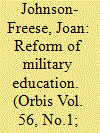

|
|
|
|
|
| Publication |
2012.
|
| Summary/Abstract |
When considering how to make the war colleges more effective, it should be remembered that first and foremost, the job of the war colleges is to educate students to make them better defenders of the United States of America and its interests and its allies around the world. However, the author gives many recommendations on how these colleges can better educate, rather than train.
It has been 25 years since the landmark 1986 Goldwater-Nichols Act reformed U.S. national defense. Part of that important legislation specifically mandated guidelines for military education, with intent to open the military culture and to encourage intellectual integration with civilians and among the services themselves. This was followed by the "Skelton Panel," chaired by Rep. Ike Skelton (D-MO). The idea behind both was simple, reflecting the classic wisdom that "the society that separates its scholars from its warriors will have its thinking done by cowards and its fighting done by fools.1 "Over a decade earlier, Admiral Stansfield Turner had similarly reformed the Naval War College (NWC), warning that if military officers could not hold their own with the best civilian strategists, the military would end up "abdicating control over its profession."
In 2010 the House Armed Service Committee issued a report titled Another Crossroads? Profession
|
|
|
|
|
|
|
|
|
|
|
|
|
|
|
|
| 5 |
ID:
108406
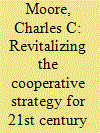

|
|
|
| 6 |
ID:
132591
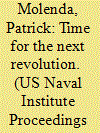

|
|
|
|
|
| Publication |
2014.
|
| Summary/Abstract |
Recent events, both in our nation's capital and across the globe, indicate that the Navy Faces an increasingly constrained financial environment and an uncertain international landscape characterized by both risk and opportunity. To set a course through an emerging era of maritime-centric security challenges, the Navy will require talented officers and future leaders who possess solid intellectual and critical thinking foundations coupled with a host of practical skills. Unfortunately, Navy shortfalls regarding advanced education are well documented, with many critics asserting that the service does not value higher learning.
|
|
|
|
|
|
|
|
|
|
|
|
|
|
|
|